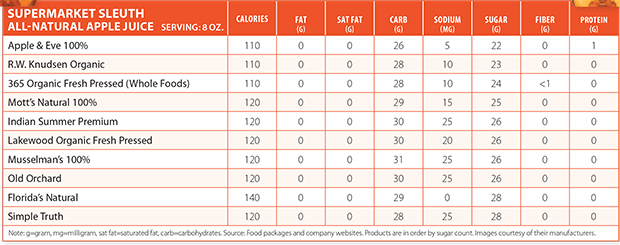Supermarket Sleuth: All-Natural Apple Juice: A Healthier Way to Quench Your Thirst
If you’re looking for a healthy alternative to sugary drinks that still can satisfy your sweet palate, try all-natural apple juice, which contains no added sugars such as high-fructose corn syrup or sucralose (an artificial sweetener). In fact, natural apple juice contains little to no ingredients at all besides the juice of apples themselves (sometimes listed as pasteurized apple juice).
WHAT YOU SHOULD KNOW
- Apple juice is high in natural sugar, so limit consumption to one 8-ounce glass a day.
- Look for juice with no high-fructose corn syrup or sucralose.
- Ascorbic acid as an ingredient is OK because it’s vitamin C.
- For higher mineral/kidney benefits, mix with one-half unsweetened cranberry juice.
Here are a few more benefits: One 8-ounce glass of all-natural apple juice contains about 270 milligrams (mg) of potassium (an electrolyte which helps with fluids, nerves, and muscles) and 72 mg of ascorbic acid—another name for vitamin C. Vitamin C is an important antioxidant, which helps fight free radicals (bad cells) in your body. It helps make collagen—a protein used in muscles, bones, skin, tendons, blood vessels, and the digestive system. It also contains L-carnitine, which transports fatty acids to the mitochondria in cells, where they are converted to energy.
Beware of These
Sugars that are added during processing are bad for your heart, your weight, and even your cognition. While there aren’t any added sugars in all-natural apple juice, one 8-ounce glass of all-natural apple juice has between 20 and 30 grams (g) of natural sugar. “So it should still be consumed in small amounts,” says Rachel Lustgarten, a registered dietitian at Weill Cornell Medicine. There are no dietary recommendations for adults, but the American Academy of Pediatrics suggests no more than 8 ounces a day for 18-year-olds, which is a good guideline for adults to follow as well.
And even though natural sugars don’t pose the health risks that added sugars do, natural apple juice also lacks certain benefits you would get if you were eating the apple itself. For instance, a medium apple with the skin on contains 4 g of fiber, which, when consumed, balances out the natural sugar as your digestive system breaks down the apple. Juice, on the other hand, contains no fiber or pulp, and so no ability to counterbalance the sugar in your bloodstream, which could possibly cause a spike, notes Lustgarten.

The post Supermarket Sleuth: All-Natural Apple Juice: A Healthier Way to Quench Your Thirst appeared first on University Health News.
Powered by WPeMatico

